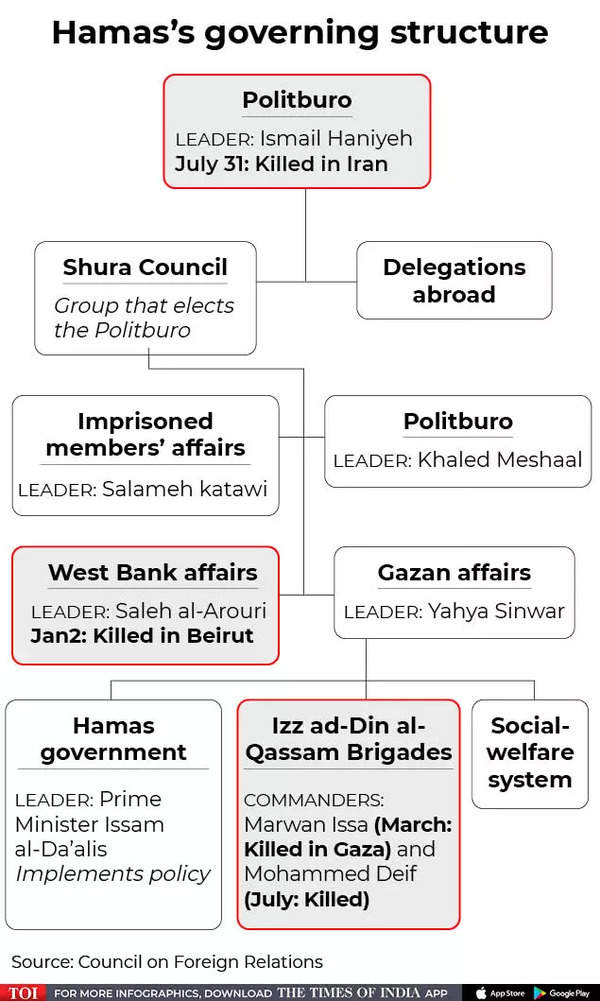A funeral ceremony was held in Tehran on Thursday for Ismail Haniyeh, the political chief of Hamas, who was killed in a strike that Iran has blamed on Israel. The ceremony was marked by calls for revenge against those responsible for his death.
Ayatollah Ali Khamenei, Iran’s supreme leader, led the prayers for Haniyeh before his burial in Qatar.
Driving the news

Ayatollah Ali Khamenei, Iran’s supreme leader, led the prayers for Haniyeh before his burial in Qatar.
Driving the news
- The assassination of Haniyeh in a foreign country occurred as Israel has struggled to effectively target Hamas’ senior leadership in Gaza, who are thought to be the primary orchestrators behind the attack on October 7.
- Israel has focused on Hamas operatives in Lebanon and Syria, but targeting Haniyeh in Iran was significantly more delicate.
- In Haniyeh’s final moments in Iran, where he was a close ally of Hamas, he was seen smiling and applauding at the swearing-in ceremony of the newly elected President Masoud Pezeshkian.
- Photos showed him seated alongside leaders from the Palestinian Islamic Jihad militant group and Hezbollah, and Iranian media showed him and Pezeshkian hugging.
- Shortly thereafter, the attack struck a residence in Tehran used by Haniyeh, resulting in his death, according to Hamas.
- As per Aljazeera, the building targeted in the strike was believed to be a residence allocated for former members of the Iranian armed forces.
- Iranian officials reported that one of his bodyguards, identified as Wasim Abu Shaaban, was also killed.
- Hamas official al-Hayya said on Iranian state television that Haniyeh was killed by a missile.
- Haniyeh’s death is the most high-profile killing of a Hamas leader since October 7. PM
Benjamin Netanyahu vowed to destroy Hamas in retaliation for the October 7 attack and Israeli officials termed Hamas leaders as “dead men walking”.
Why it matters
- Haniyeh’s killing is significant not just because of his leadership role in Hamas but also due to the unprecedented location and timing of the strike.
- Haniyeh’s killing in a protected apartment in downtown Tehran is deeply embarrassing for the regime.
- The assassination occurred just hours after Iran’s new president’s inauguration, when Tehran was on high alert, filled with senior officials and foreign dignitaries, making the strike even more audacious.
- Iran’s sophisticated air defenses and tight security measures make an undetected external airstrike highly unlikely, suggesting the possibility of internal complicity or severe security lapses.
- Analysts told AFP that Haniyeh was a moderating influence within the Islamist group, and that while he would be replaced, the dynamics within Hamas could change.

What they are saying
- Iranian state media and Hamas attributed the strike to Israel, but the event has been deeply embarrassing for Tehran, indicating that such an operation might have required internal assistance.
- Haniyeh’s assassination “takes the battle to new dimensions and will have major repercussions on the entire region,” Hamas’s military wing said.
- Iran’s Supreme Leader Ayatollah Ali Khamenei vowed revenge against Israel, saying it had “prepared a harsh punishment for itself” by killing “a dear guest in our home.”
- Israeli Prime Minister Benjamin Netanyahu said Israel “will exact a very heavy price from any aggression against us on any front” but did not mention the killing specifically.
- “We want revenge because Israel killed Haniyeh, who was our guest,” an Iranian woman told state TV.
- While the mood was buoyant in Israel, residents in besieged Gaza feared Haniyeh’s death would prolong the fighting. “This news is scary. We feel that he was like a father to us,” Gaza resident Hachem Al-Saati told Reuters.
Between the lines: Iran’s inside hand?
- As per a Foreign Policy report, Haniyeh’s assassination in Tehran highlights internal aid within Iran and sends a message of insecurity to the Iranian regime.
- Grassroots Iranian support for Israel has grown, with many Iranians expressing pro-Israel sentiments online and in Western demonstrations. This is partly because of the 2022 “Woman, Life, Freedom” movement in Iran, which demanded gender equality and regime change, faced brutal government repression.
- Iranians see similarities between Hamas’s actions on October 7 and their own government’s brutal crackdown on protesters, leading to increased support for Israel out of opposition to the Iranian regime.
- Despite the risk of being labeled as “spies,” many of the assassination plots attributed to Israel within Iran are believed to be carried out by local Iranian recruits
- “The support for Israel inside Iran has grown not because of any deep love for the Jewish state, but instead out of the public’s abhorrence of its own government,” the FP report said.
What next
- Analysts and Hamas officials have indicated that Khaled Meshaal, Haniyeh’s deputy-in-exile residing in Qatar, is the most probable candidate to succeed him as the leader of the organization.
- But the assassination of Haniyeh is unlikely to significantly alter the situation in Gaza, as he primarily resided in Doha, Qatar, where he was said to lead an opulent life while serving as Hamas’s global representative.
- Nevertheless, his death will undoubtedly hinder the ongoing ceasefire negotiations, further diminishing the already slim chances of a hostage release agreement and a diplomatically resolved end to the conflict, the FP report said.
- The setback in peace talks could potentially provide a distraction from the internal political challenges faced by the Israeli government, allowing Netanyahu and his allies to maintain their hold on power for the time being.
- Khamenei, Iran’s supreme leader, has commanded Iran to launch a direct attack on Israel as retribution for the assassination of Haniyeh in Tehran, a New York Times report said.
- Observers will need to closely monitor internal Iranian responses and external diplomatic efforts to gauge the broader implications of this high-profile assassination.
- The potential for a wider regional conflict remains a significant concern as both nations navigate the fallout from this event.
(With input from agencies)
